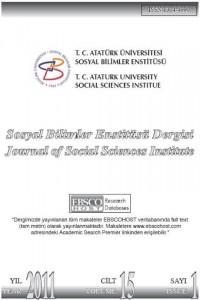Abstract
The study explores the different conceptions regarding the status and role of the author in both literary practice and critical theory from the romantic period through the nineteenth-century to the contemporary reevaluation of the producer of the literary work. By its expressive theory of authorship, Romanticism marked the rise of the idea of the supremacy of the author, the idea being challenged and surpassed by the nineteenth-century critical opinions, whereas the twentieth century structuralist and post-structuralist points of view proclaimed the death of the author. However, there are contemporary critical and literary voices, among whom Ian McEwan, who reaffirm the importance and omnipotence of the author against all emphases on textuality, the reader, and the cultural discourses by such critics as Wimsatt and Beardsley, Walter Benjamin, Roland Barthes, Michel Foucault and others.
Abstract
Çalışma, Romantik dönemden on dokuzuncu yüzyıla, edebî eserin yaratıcısının çağdaş değerlendirmesine kadar,edebî uygulamada ve eleştiri teorisinde yazarın statüsü ve rolüyle ilgili farklı kavramları inceler. Romantizm, anlatımsal yazarlık teorisiyle yazarın üstünlüğü düşüncesinin yükselişini belirlemiştir. Bu düşünce, on dokuzuncu yüzyıl eleştirel fikirleri ile gölgede bırakılmış, yirminci yüzyıl yapısalcılık ve yapısalcılık sonrası savlar, yazarın ölümünü ilân etmiştir. Fakat, içlerinde Ian McEwan’ın da olduğu çağdaş eleştirel ve edebî düşünürler, Wimsatt ve Beardsley, Walter Benjamin, Roland Barthes, Michel Foucault gibi eleştirmenlerin metinsellik, okur ve kültürel söylemler üzerindeki vurguları karşısında yazarın önemini ve sınırsız gücünü doğrulamışlardır.
Details
| Primary Language | English |
|---|---|
| Journal Section | Makaleler |
| Authors | |
| Publication Date | May 14, 2012 |
| Published in Issue | Year 2011 Volume: 15 Issue: 1 |

